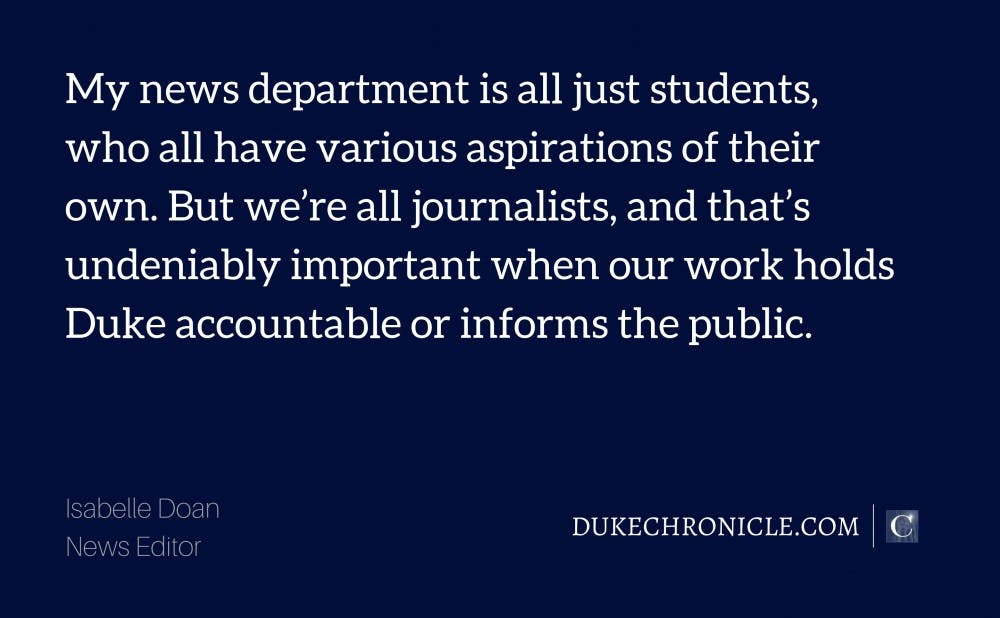Here is what you do not know about the press section of the Supreme Court of the United States.
A staff member leads reporters single file from the press room to the hallway. We walk in straight lines through the Supreme Court to a side door of the Courtroom. We’re ushered in according to a seat number. More important reporters get to squeeze into alcoves at the side of the Courtroom. Less important reporters sit in the back, their view of the bench severely obstructed by massive marble columns. (I like to joke that it was an obstruction of justice.)
When I went to cover a Supreme Court case for The Chronicle, I was assigned a seat in the back. I was squeezed between two people, balancing on a too-hard wooden chair, with only my legs to lean on to take notes. Two Justices were visible, with a third perceptible if I craned my neck.
It was surely an uncomfortable experience—and yet it was the experience that reaffirmed my love for what I do at The Chronicle.
When first I entered the Supreme Court, I asked a security guard where press should go. He said to go to the left, and I did, but I hesitated when I was faced with a barrier. The barrier occluded the hallway just enough so that a person could go around. But the message was clear—if you’re not supposed to be back there, don’t go back there.
After I stared at the barrier for a good minute, the security guard told me that I could just go around. But even then, when I went around the barrier and I saw the press room, I couldn’t go inside. Panic struck me. I felt an imposter—I wasn’t a journalist, not like the people milling about the press room.
I called Bre, our editor in chief and the person who had driven me up to D.C. When she picked up the phone, word salad spilled out of my mouth. I told her I couldn’t do it. I didn’t know what to do. There were real journalists in there.
Bre told me that didn’t matter. I had a place in there, and I should take it.
This year, I was news editor for The Chronicle, but it felt like a mantle I could never really fill. I’d never taken any journalism classes before or done any journalism outside this newspaper. I often wouldn’t trust my own judgement.
I took my first journalism class this semester, a science writing class filled with graduate students in the sciences and not a single student interested in career journalism. One student asked the professor when someone becomes a journalist—after writing a single news article? If not, then when? Could the students consider themselves journalists?
The professor, knowing that I was a part of The Chronicle, asked me what I thought. I said, “I don’t know. I don’t consider myself a journalist.” He told me that I shouldn’t say that—it denigrated all the work I’d done.
I recognize that now. My news department is all just students, who all have various aspirations of their own. But we’re all journalists, and that’s undeniably important when our work holds Duke accountable or informs the public.
This year, we’ve written stories that have enabled actual change at Duke, from injustice regarding housekeeping shifts to student insurance changes. And yes, we did that while taking biochemistry and working other jobs.
I haven’t devoted three years to The Chronicle because I want a line on my resume or because I need published stories to go into journalism. I’ve devoted almost 1200 hours to The Chronicle because I think this work is incredibly important, and because I love everyone who works in 301 Flowers.
I’ll cherish the time that I got to go to the Supreme Court, among many other opportunities that The Chronicle has given me. But above all, I’ll always treasure the three great years I’ve had as a writer and editor for this newspaper—the place where I got to become a real journalist.
Isabelle Doan is a Trinity junior studying public policy and biology. She served as news editor of The Chronicle’s 114th volume. She’d like to thank her wonderful masthead. Shagun, for always knowing what to say. Lexi, for the long talks about the future. Nathan, for always being supportive. Ben, for being the funniest person in the office. Bre, for the care she puts into every aspect of The Chronicle.
Get The Chronicle straight to your inbox
Signup for our weekly newsletter. Cancel at any time.

